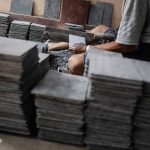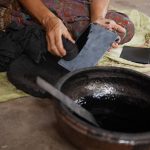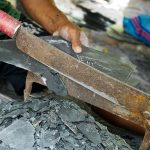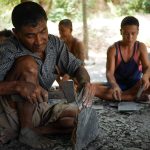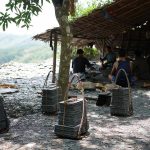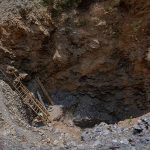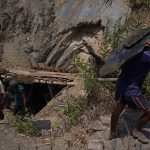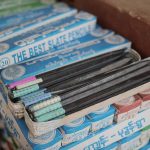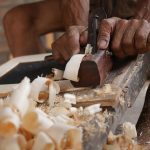The Irrawaddy Magazine |
- Legality of Mon State Cement Factory’s Power Plant Questioned
- Govt, Military Discuss ‘Terrorist’ Label for Rakhine State Militants
- Business Mogul Tay Za Makes Surprise Appearance at SEA Games
- Defense Ministry Rejects Relocation of Sulfuric Acid Factory
- Former Myanmar Peace Center Director Appointed to Ceasefire Monitoring Committee
- State Counselor Honors Former NLD Chairman at Funeral
- Asia’s Biggest Budget Airline Trains Crew to Spot Human Traffickers
- Factory Farming in Asia Poses Environmental, Forced-Labor Risks: Report
- The Last Slate-Makers of Mon State
| Legality of Mon State Cement Factory’s Power Plant Questioned Posted: 17 Aug 2017 07:37 AM PDT MAWLAMYINE, Mon State — A controversial 500-ton cement factory in Mon State's Kyaikmayaw Township has not sought permission from the Ministry of Electricity and Energy in order to generate power, according to the ministry. The US$400 million cement factory run by Mawlamyine Cement Limited (MCL) – a joint venture between Thai firm Siam Cement Group (SCG) and Pacific Link Cement Industries—is powered by a 49-megawatt coal-fired power plant. The committee for the assessment of financial, planning and economic matters in the Mon State Parliament asked the Ministry of Electricity and Energy in a letter on August 7 about the coal-fired power facilities the cement factory. The ministry replied on August 14 that MCL had not sought permission to run the power plant. "From the ministry's reply, we can confirm that MCL didn't follow the electricity law. They did discuss with the ministry the installation of two 20-megawatt turbines. But they didn't get any permission," U Aung Kyaw Thu, chairman of the Mon State parliamentary committee, told the press on Wednesday. However, executive officer U Zaw Lwin Oo of MCL said at a public consultation meeting on Thursday that MCL had in fact received permission from the Ministry of Industry to generate 20 megawatts of electricity. "The industry ministry has given its approval for the production of 20 megawatts. It gave permission on March 19, 2017. If you have any questions, please ask the concerned ministries. We can only operate with permission," U Zaw Lwin Oo told the press. According to him, MCL has two 20-megawatt turbines and a 9-megawatt spare turbine, but the industry ministry has only given approval for 20 megawatts; the cement factory is powered by a single 20-megawatt turbine. According to Myanmar Investment Commission, MCL signed the contract in March 2013 with the previous government to operate the cement factory for next 45 years. According to the proposal from MCL, the factory's estimated annual income is 159.8 billion kyats, expenditures are 127.23 billion kyats, and net profit is 32.57 billion kyats per year, and it will take around nine-and-a-half years for the company to break even. On April 5, the President's Office sought remarks from the Ministry of Electricity and Energy about the MCL cement factory's coal-fired power plant. The ministry remarked that the cement factory needed the approval of the government because it had installed an electricity capacity of at least 40 megawatts. According to the 2008 Constitution, heavy-scale electricity production—classified as 30 megawatts and above—needs the approval of the Union government. Dr. Aung Naing Oo, deputy speaker of the Mon State Parliament, said that he personally welcomed the MCL's investment in the state, but that its procedures are less transparent than he would like them to be. "We should welcome investments. But at the same time, we need to see if those investments are legal and serve the stated purposes. Anyway, if there is no permission under the electricity law, the factory should not operate," he told The Irrawaddy. The factory started commercial operations in April despite local opposition. On Feb. 18, around 7,000 locals from seven villages near the factory staged a protest against the coal-fired power plant. In April last year, locals sent a petition with 3,780 signatures to the President's Office, demanding the termination of the project. Mon State minister for electricity, energy and industry Min Htan Aung Han told the Mon State Parliament in June that since MCL started its project three years ago, it had spent 62 million kyats on corporate social responsibility work in 2014, 1.6 billion kyats in 2015, 323 million kyats in 2016 and 338 million kyats in 2017. The post Legality of Mon State Cement Factory's Power Plant Questioned appeared first on The Irrawaddy. |
| Govt, Military Discuss ‘Terrorist’ Label for Rakhine State Militants Posted: 17 Aug 2017 07:32 AM PDT NAYPYITAW — State Counselor Daw Aung San Suu Kyi has been holding talks with military leaders regarding the labeling of militants in northern Rakhine State as terrorists, government spokesperson U Zaw Htay told The Irrawaddy. "There have been discussions between the State Counselor and military leaders about labeling them as a terrorist organization," he told The Irrawaddy on Thursday. "As a result of the meeting, we have released a statement. In the English version of the statement, we used the term 'terrorist act.' The leaders are still discussing details," he added, referring to the killing of civilians in Maungdaw Township. The National League for Democracy government of initially used the terms "extremist" and "terrorist activities" in an Aug. 11 press release by the State Counselor's Office on Rakhine State. The statement said that 59 people had been murdered in the area and 33 had gone missing, noting that village heads and those believed to be cooperating with the government or speaking to the media appeared to have been targeted. Specifically mentioned were seven ethnic Mro—a sub-group of the Arakanese—who were found dead of gunshot and machete wounds in early August. Of those believed to be responsible, the State Counselor's Office said: "They are making death threats in order to prevent the people from cooperating with the government as well as to disrupt the national [citizenship] verification process and the peace and security of the region." The Myanmar government is still investigating whether the Arakan Rohingya Salvation Army (ARSA) has established connections with groups based outside the country, and with individuals who have released statements online calling for attacks in the region. "We have yet to be sure whether the ARSA and the group which committed the destructive acts in Maungdaw are the same group…We need evidence. Only then, will we be able declare certain groups as terrorists," U Zaw Htay told The Irrawaddy. The ARSA released its own statement of demands in March, which included the provision of Myanmar citizenship, and access to education, aid, and freedom of movement for the Rohingya population. It also stated that its target is the "oppressive Burmese regime." During the Upper House session on Wednesday, military representative Lt-Col Ye Naing Oo urged the Parliament and government to label militants in Maungdaw as terrorists. He suggested that this would deter local and international organizations from providing them with "support" on the pretext of protecting human rights in the region, as well as stop the international media from "spreading propaganda" about them. "Since they are connected with international terrorist organizations, only when we designate them as a terrorist group, will we be able to raise the issue to the UN Security Council with the assistance of international counter-terrorism agencies," said Lt-Col Ye Naing Oo. "Only then can we get help to effectively deter the support for [local] terrorist organizations," he said as he discussed a proposal put forward by the Arakan National Party's (ANP) U Khin Maung Latt which urged the Union government last week to identify and take action against militants active in Maungdaw, Buthidaung and Rathedaung townships under the 2014 Counter-Terrorism Law. It would not be the first time that a Myanmar legislature has debated the use of the terrorist label: in early December 2016, the Shan State parliament voted to brand the Kachin Independence Army, the Ta'ang National Liberation Army, and the Myanmar National Democratic Alliance Army as "terrorist organizations," following an urgent Union Solidarity and Development Party proposal to do so, citing offensives by the groups against the Myanmar Army. A similar proposal was previously voted down in the Union Parliament. A total of 24 parliamentarians have registered for the current debate concerning militancy in northern Rakhine State, and only five have debated the proposal so far. According to a July 21 statement from the State Counselor's Office, a group called Aqa Mul Mujahidin conducted fatal attacks on Burmese border police outposts along the Bangladesh-Myanmar border last October, and in March of this year, merged with the Rohingya National Security Committee, re-forming as the Arakan Rohingya Salvation Army. Links between the groups are still being investigated. Translated from Burmese by Thet Ko Ko The post Govt, Military Discuss 'Terrorist' Label for Rakhine State Militants appeared first on The Irrawaddy. |
| Business Mogul Tay Za Makes Surprise Appearance at SEA Games Posted: 17 Aug 2017 05:32 AM PDT YANGON — In his first public appearance for years, business mogul U Tay Za presented US$10,000 to the Myanmar men's football team on Monday after the team beat Singapore in the 29th SEA Games in Malaysia. According to sources, U Tay Za has been in Malaysia since Sunday, together with his son Ko Pyae Phyo Tay Za and two other so-called cronies—U Aung Ko Win, the chairman of Kanbawza Group (KBZ), and Max Myanmar Co. chairman U Zaw Zaw. Of the Myanmar Football Federation, U Aung Ko Win is patron, U Zaw Zaw is chairperson, and Ko Pyae Phyo Tay Za is vice-chairperson. U Tay Za, 53, was last seen in public in 2015 when he held a press conference at his residence on Inya Road in Yangon, claiming that he had found uranium in Upper Myanmar. Over the past few years he has lived in the Thai capital of Bangkok while his two sons have managed his businesses in Myanmar. U Tay Za's recent public appearance, however, coincidences with an apparent return to the business stage, as on August 5 he met Vietnam's Petrolimex chairman Dr. Bui Ngoc Bao in Yangon. Hanoi-based Petrolimex, also known as Vietnam National Petroleum, is one of Vietnam's biggest oil and gas producers. Company staff were visiting Myanmar to study the market and draft business plans for partnership, according to Vietnam media reports, after signing a memorandum of understanding (MoU) with U Tay Za's Htoo Group of Companies in Hanoi in July. In a press release, Htoo Co. stated that Dr. Bui Ngoc Bao also discussed plans with managing director U Pyae Phyo Tay Za. It would be U Tay Za's first business partnership with an international company since he was removed from the US sanctions list last October. U Tay Za's father, who was known as Shangyi Myint Swe in the military circle, had close ties with late military dictator and chairman of the Burma Socialist Programme Party Ne Win. U Tay Za gained notoriety from accumulating enormous wealth under the junta, mainly from logging. He had, however, pledged to support the development of education and health sectors in border regions to recompense for his controversial business dealings. He is said to be closely associated with retired dictator Snr-Gen Than Swe, and was blacklisted by the US government in response to his alleged role as a broker in the regime's procurement of arms and ammunitions from Russia. In 2014, the US government pressured Singapore authorities to shut down bank accounts of U Tay Za's Singapore investment firm on suspicion that it had made transactions involving North Korean-linked companies. In an interview with Forbes in 2014, he complained that US sanctions were stifling his businesses and officials were scrutinizing his every transaction. Because of US sanctions, U Tay Za was not able to purchase equipment for his airline Air Bagan according to market prices. For this, he reportedly suffered a loss of around US$90 million and the airline has been struggling as a result. His other businesses include Asia Green Development Bank and a chain of hotels and resort. He even planned to build a luxury resort in Kachin State's Putao, which is known for its snow-capped mountains. Translated from Burmese by Thet Ko Ko. The post Business Mogul Tay Za Makes Surprise Appearance at SEA Games appeared first on The Irrawaddy. |
| Defense Ministry Rejects Relocation of Sulfuric Acid Factory Posted: 17 Aug 2017 02:08 AM PDT NAYPYITAW — The Ministry of Defense has rejected a parliamentarian's request to relocate a sulfuric acid factory in Sagaing Region's Salingyi Township during the Lower House session on Wednesday. Lawmaker U Win Thein Zaw of Salingyi Township raised a question about the military-owned factory operated under Myanma Economic Holdings Ltd (MEHL) near the village of Kan Kone in his constituency, citing locals' concerns over their health and the environmental impact of the factory. But Deputy Defense Minister Maj-Gen Myint Nwe defended the factory, saying that it does not harm locals, and that it serves the interests of the country. The factory provides sulfuric acid used in refining copper to the China-backed Letpadaung copper mines. He claimed that the factory does not cause social or environmental impacts and has even received three ISO certificates because it employs advanced production technologies. The Letpadaung mines have been an ongoing source of controversy and protest, with accusations of forced eviction, environmental destruction and the suppression of peaceful protests. The Letpadaung Copper Mines Investigation Commission led by then-lawmaker Daw Aung San Suu Kyi inspected the factory around 2013, and recommended that MEHL register the factory as a private factory, according to the deputy minister. "During the registration process, we sought approval from the Ministry of Industry annually to run the factory," said Maj-Gen Myint Nwe. Lawmaker U Win Thein Zaw said that the factory started operation on August 19, 2007 and operated illegally until the Daw Aung San Suu Kyi-led investigation commission inspected it in 2013. It then received permission for continued operation on a trial basis. He called for the relocation of the factory away from residential areas, citing international practices that call for a buffer zone between residential areas and a facility manufacturing hazardous chemicals. He said the factory is not in line with 2008 Constitution, citing Article 45 which states that the Union shall protect and conserve the natural environment, Article 390 that states that every citizen has the responsibility to conserve the environment, and Article 41 of the Myanmar Investment Law, which bans investments that could potentially cause harm to the people, the environment and ecosystem. His presentation showed pictures of damaged crops plantations that he claimed were harmed by emissions. The deputy defense minister stated that the factory would not be relocated, saying that it strictly followed the guidelines of the Letpadaung Copper Mines Investigation Commission, with two percent of the net profits from the factory being used for regional development and 51 percent of the profits from the Letpadaung copper mines going to state funds. He said the Canada-based Green Environmental, Health, Safety & Social Consultancy Co had conducted an environmental and social impact assessment (ESIA) in 2014, and MEHL submitted the EISA report to the Ministry of Resources and Environmental Conservation and implemented the ministry's 42 recommendations. The sulfuric acid factory is a joint venture between MEHL and China North Industries Corporation commonly known as Norinco, which is involved in a wide range of businesses including automobiles, machinery, optical-electronic products, oil field equipment, chemicals, light industrial products, explosives and blast materials, civil and military firearms and ammunition and hi-tech defense products. The two partners signed the contract on July 25, 2005 and constructed the factory on May 15, 2006. The US$5 million factory came into operation on April 20, 2007, and has a production capacity of 50 tons of sulfuric acid per day, according to the Defense Ministry. The post Defense Ministry Rejects Relocation of Sulfuric Acid Factory appeared first on The Irrawaddy. |
| Former Myanmar Peace Center Director Appointed to Ceasefire Monitoring Committee Posted: 17 Aug 2017 01:51 AM PDT YANGON — A former director of the Myanmar Peace Center, U Aung Naing Oo, has been appointed to the role of executive director of the Technical Secretariat Center (TSC) of the Union-level Joint Ceasefire Monitoring Committee (JCM). The appointment was approved at the JCM's 11th regular meeting, which was held last month at the National Reconciliation and Peace Center office in Yangon. U Aung Naing Oo, who worked for the Myanmar Peace Center's peace dialogue program from 2012-15, contributed to the drafting of the nationwide ceasefire agreement (NCA). He also formerly served as a deputy director of the Vahu Development Institute, head of the All Burma Students Democratic Front (ABSDF)'s Jungle University and as a member of the foreign affairs committee of the National Council of the Union of Myanmar. Former Director Dr. Min Zaw Oo left the position at the end of July after the JMC accepted the appointment of U Aung Naing Oo. The JCM was formed as the official body to monitor ceasefire implementation for signatories of the NCA, in an effort to advance the peace process. In January 2016 the JMC formed five state-level committees in Karen, Mon and Shan states, and Bago and Tanintharyi Regions. In February 2017, the JMC-TSC was given permission to seek $6.5 million in funds for the 2017-18 fiscal years, which it secured from international donors. The post Former Myanmar Peace Center Director Appointed to Ceasefire Monitoring Committee appeared first on The Irrawaddy. |
| State Counselor Honors Former NLD Chairman at Funeral Posted: 16 Aug 2017 11:10 PM PDT YANGON — Myanmar State Counselor Daw Aung San Suu Kyi praised a former chairman of the National League for Democracy (NLD) as someone "who always stood for democracy" at his funeral in Yangon on Thursday. In her public eulogy at Yeway Cemetery, the State Counselor noted that her party was lucky enough to have a leader like U Aung Shwe, who passed away on Sunday. He was 99. The former brigadier general and ex-ambassador served as the second acting chairman for the NLD in 1990 while Daw Aung San Suu Kyi and the then party leader U Tin Oo were under house arrest. U Aung Shwe led the party when the then military regime tried its best to destroy the NLD. In 1991, the regime forced him to either expel Nobel Peace laureate Daw Aung San Suu Kyi or dismantle the NLD. Left with no choice but to keep the party alive, U Aung Shwe expelled her, and faced serious criticism as a result. But he handed the leadership position back to Daw Aung San Suu Kyi when she was released in 1995. Rather than punishing him for her expulsion, Daw Aung San Suu Kyi praised him as one of the "guardians" of the party. "Our NLD is able to stand as it is today because of him," she said at the wake, which was attended by thousands of people. The State Counselor said she honored him as a person, a former brigadier general, and an ex-ambassador. "Especially, I would like to honor him for his former chairmanship of the NLD as well as being a leader in the struggle for democracy," she said. "The way to honor him is simple. It would be best for him if we make a vow for collaboration to build a true democracy." The post State Counselor Honors Former NLD Chairman at Funeral appeared first on The Irrawaddy. |
| Asia’s Biggest Budget Airline Trains Crew to Spot Human Traffickers Posted: 16 Aug 2017 10:25 PM PDT KUALA LUMPUR — AirAsia, the biggest budget carrier in Asia, is training thousands of its staff to fight human trafficking, becoming one of the first airlines in the continent to crack down on the global crime. Companies have come under increased pressure to tackle human trafficking, with an estimated 46 million people living in slavery and profits thought to be about US$150 billion. Planes are a key part of the illegal business, as criminal gangs transport thousands of children and vulnerable people by air each year for redeployment as sex workers, domestic helpers or in forced labor. The United Nations has urged airlines to step in and look out for the tell-tale signs of trafficking. Kuala Lumpur-based AirAsia, which flies millions of passengers annually to more than 110 destinations, said it was planning to train between 5,000 and 10,000 frontline staff, including cabin crew. "We like to be able to have our staff know what to do if somebody comes up to them and says 'I need help'," said Yap Mun Ching, the executive director of AirAsia Foundation, the airline's philanthropic arm, which is driving the initiative. "Sometimes [the victims] don't know they have been trafficked. They realize it only when they are on their way and they want to be able to get help. Most of the time they don't know who to turn to," she told the Thomson Reuters Foundation. AirAsia has teamed up with US-based Airline Ambassadors International, a group that trains airline staff on trafficking, for the initiative, which kicked off this week at the airline's four main hubs—Kuala Lumpur, Bangkok, Jakarta and Manila. All are hotspots for trafficking. The group said signs of trafficking include young women or children who appeared to be under the control of others, show indications of mistreatment or who seem frightened, ashamed or nervous. The UN Office on Drugs and Crime urged airline bosses at a summit in June to train flight crews to help combat human trafficking, the first time the aviation industry has held global discussion on the issue. While some training of airline staff to spot and report potential trafficking is mandatory in the United States, it is not widespread across the industry. So far, more than 70,000 US airline staff have been trained under a program that began in 2013. Asia has some of the worst offenders of human trafficking. Countries such as Thailand, Myanmar and Laos are listed by the United States on a trafficking watch list for not meeting the minimum standards needed to end the crime. The post Asia's Biggest Budget Airline Trains Crew to Spot Human Traffickers appeared first on The Irrawaddy. |
| Factory Farming in Asia Poses Environmental, Forced-Labor Risks: Report Posted: 16 Aug 2017 10:11 PM PDT MUMBAI — The rapid growth of factory farming in Asia for livestock and seafood poses enormous environmental and forced labor risks, in addition to threats to public safety and health, according to a report by an investor network. Half Asia’s aquaculture production is from factory farms, said the report published this week by Farm Animal Investment Risk & Return (FAIRR), referring to the major, industrial operations that raise large numbers of animals for food. "Asia’s meat, seafood and dairy industries face a range of badly managed sustainability risks – from emissions to epidemics, fraud to food safety, and abuse of labor," said Jeremy Coller, founder of FAIRR. "It is clear that significant environmental and social risks are building up." Meat demand in Asia is predicted to grow by a fifth to 144 million tons by 2025 as populations expand and incomes rise, the report said. China, which has the largest animal population in Asia, is promoting large-scale farming for greater efficiency and economies of scale. But the practice has serious environmental repercussions, besides leading to rural job loss and land rights violations, said the report published together with Singapore-based Asia Research and Engagement. Cows, goats and chickens have higher greenhouse gas emissions and water footprints than other proteins. In addition, crops grown to feed them are causing forest loss. In Myanmar's Irrawaddy delta, for example, most mangrove forests have been cleared for shrimp ponds, while the growth in soy cultivation in Latin America for China’s pork and poultry production has come at the expense of rainforests. Asia's factory farms also increase the risk of forced labor of migrants, children and trafficked workers, the report said. Thailand's multibillion-dollar seafood sector has come under fire in recent years after investigations showed widespread slavery, trafficking and violence on fishing boats and in onshore food processing units. Last month, Thai Union – the world's largest canned tuna company – in an agreement with environmental group Greenpeace, said it would take steps towards sustainably caught tuna while ensuring all workers are "safe." Also earlier this year, a Thai court dismissed a compensation claim by 14 migrant workers fromMyanmar who had alleged labor violations at a chicken farm that supplied the European Union. "Top producers are working towards developing sustainable production systems, certified through an increasing number of ecolabels," said Coller. "But a general lack of traceability in supply chains has made it difficult…to evaluate and mitigate these risks." The post Factory Farming in Asia Poses Environmental, Forced-Labor Risks: Report appeared first on The Irrawaddy. |
| The Last Slate-Makers of Mon State Posted: 16 Aug 2017 07:22 PM PDT Once used in schools across the country, writing slates are now rare. The Irrawaddy revisits this article from May 2015 about the dying, local industry. MUDOON, Mon State — The business of making writing slates (known in Myanmar as kyauk thin bone), one of Mudoon Village's most famous trades, is now a dying industry. Slates are a unique product of Mudoon because plenty of the rock can be found around Mudoon village on Bilu Island, across the Salween River from Moulmein in Mon State. Past generations of Mudoon villagers earned their living producing writing slates that they could distribute throughout the country. Slates were formerly an important stationary item for Myanmar elementary students. They were cheaper than notebooks and could be used for a longer period. One could also erase and rewrite on them innumerable times, while notebooks, in days gone by, were not only expensive but also difficult to find. But around two decades ago, students eventually stopped using slates to write and practice their lessons on when notebooks became more affordable. There are only two families left in the whole village who continue running their slate businesses. They still have a few buyers in areas of Irrawaddy Division, including Myaung Mya, Pathein and Hinthada. Thein Kyi, the owner of one of the last slate-making ventures in the village, said he wished to continue his unique family-run business until all demand for writing slates had dried up. "There were over one hundred families of slate-makers in the old days. One of the main reasons these people stopped their businesses was that the demand from buyers dramatically decreased. Only my family and one other still have some buyers from the Delta regions," said Thein Kyi, who has been running his business, "Pyin Nya Mon," for over 20 years. It has become very difficult to hire workers to produce slate, Thein Kyi said, as many people in the village have left for the Thai border in the hope of alternative work. Aung Moe, a 45-year-old who works extracting slate, said about two-thirds of village youth had left to work in the Thai or Malaysian fishing industries. "So many workers have left the village… to earn more money," he said. Aung Moe and his co-workers begin work around 7 am every day. There are camps for slate extractors close to the slate mines on Thin Bone Mountain which is only a few minutes from Mudoon village. A slate extracting worker normally earns at least 6,000 kyat per day. They go down dark and dangerous mines, often descending to around 150 feet to extract and carry big pieces of slate back to the camps where they cut the pieces to the required size. These days some tourists who visit Moulmein also come to see Myanmar's last surviving slate-makers in Mudoon Village. There are about 70 villages on Bilu Island and Mudoon is one of the bigger ones, with over 1,000 households. With the production of writing slate seemingly in its dying days, most people in the village now make their living in agriculture. The post The Last Slate-Makers of Mon State appeared first on The Irrawaddy. |
| You are subscribed to email updates from The Irrawaddy. To stop receiving these emails, you may unsubscribe now. | Email delivery powered by Google |
| Google Inc., 1600 Amphitheatre Parkway, Mountain View, CA 94043, United States | |

